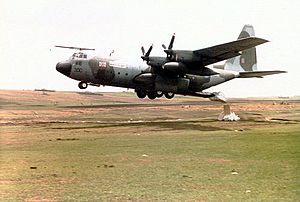Humanitarian aid facts for kids
Humanitarian aid is like a helping hand given to people who are going through really tough times. This could be because of a natural disaster like an earthquake or a flood, or a war, or if they have become refugees and had to leave their homes. The main goal is to help people keep their dignity and get the basic things they need to survive.
Contents
What is Humanitarian Aid?
Humanitarian aid is all about giving help and support to people in need. It's given without taking sides, and it focuses on helping people who are suffering. This kind of help follows special rules, like the laws of war and international human rights law, which are about treating everyone fairly and with respect.
Why is Aid Important?
When big disasters happen, like huge storms or earthquakes, many people can lose their homes, food, and even their families. In places where there is war, people might not have safe places to live or enough to eat. Humanitarian aid steps in to provide urgent help. It makes sure people get things like food, clean water, shelter, and medical care when they need it most.
Who Provides Humanitarian Aid?
Many different groups and organizations work together to provide humanitarian aid. Some of the biggest ones include:
- The International Red Cross and Red Crescent Movement: This is a huge network of volunteers and staff around the world. They help people affected by conflicts and disasters.
- The United Nations (UN): The UN has many different parts that help with aid. The Office for the Coordination of Humanitarian Affairs (OCHA) helps to organize all the different aid groups.
- Other Aid Agencies: There are also many other groups, big and small, that work to help people. These can be charities, non-profit organizations, or even governments from different countries.
How is Aid Delivered?
Aid can be delivered in many ways, depending on what people need and where they are.
Food and Water
When people don't have enough to eat or drink, aid groups bring in food packages and clean water. Sometimes, they use special planes to drop food from the sky, especially in hard-to-reach places. They also provide things like Plumpy'nut or water purification tablets.
Shelter and Safety
After a disaster, many homes might be destroyed. Aid workers help set up temporary shelters, like tents or simple buildings, so people have a safe place to sleep. They also try to keep people safe from harm, especially children and vulnerable adults.
Medical Help
Doctors and nurses from aid organizations often set up temporary clinics or hospitals. They treat injuries, prevent diseases, and give medicines to people who are sick. This is very important because diseases can spread quickly in crowded emergency camps.
A Brief History of Humanitarian Aid
The idea of organized humanitarian aid started a long time ago.
Henry Dunant
One important person was Henry Dunant. In 1859, he saw the terrible suffering of wounded soldiers after a battle in Solferino, Italy. He organized local people to help everyone, no matter which side they fought for. His experience led him to write a book called A Memory of Solferino.
Geneva Conventions
Dunant's ideas helped create the Geneva Conventions. These are a set of international rules that say how people should be treated during war. They protect wounded soldiers, prisoners of war, and civilians. These rules are a big part of how humanitarian aid works today.
Images for kids
-
A UNICEF worker is distributing high-calorie food during an emergency situation in Goma, in the Democratic Republic of the Congo, in 2008.
-
Henry Dunant at Solferino
-
Original Geneva Conventions
-
A contemporary print showing the distribution of relief in Bellary, Madras Presidency. From the Illustrated London News (1877).
-
World Food Programme distributing food in Liberia
-
An American soldier gives a young Pakistani girl a drink of water as they are airlifted from Muzaffarabad to Islamabad following the 2005 Kashmir earthquake.
-
UNICEF humanitarian aid, ready for deploying. This can be food like Plumpy'nut or water purification tablets.
-
Wanda Błeńska, Polish leprosy expert and missionary who successfully developed the Buluba Hospital in Uganda
-
Bangladeshi citizens offload food rations from a US Marine CH-46E helicopter of 11th Marine Expeditionary Unit after Tropical Cyclone Sidr in 2007
See also
 In Spanish: Ayuda humanitaria para niños
In Spanish: Ayuda humanitaria para niños
 | Leon Lynch |
 | Milton P. Webster |
 | Ferdinand Smith |

















